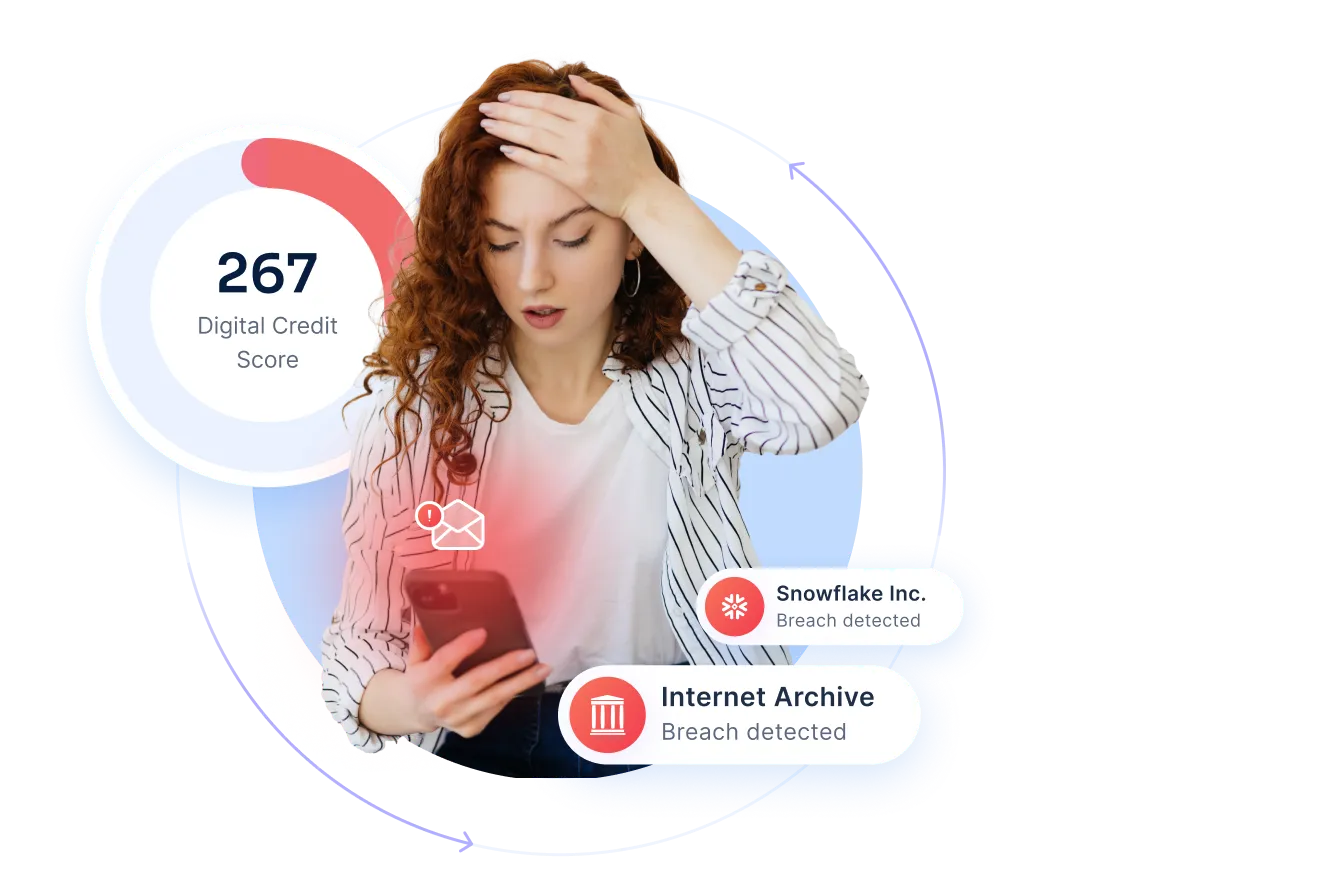The Role of Social Account Search by Email Address and How to Use It in Lending
Learn how lending organizations can use social media lookup to increase the effectiveness of credit risk management.

There are 5.04 billion social media users worldwide. This means that 62% of the world's population has profiles on various platforms.
Social media user search may interest professionals in many industries, including recruiters, lawyers, journalists, and others.
This material will focus on the benefits of social net capability for lending organizations.
Why do lenders need to find social media accounts by email?
Registering an account on most social platforms requires an email address. This fact makes the email a key to uncovering the digital footprint of its owner. Lending organizations often use a specialized email lookup service for this purpose. It allows them to quickly identify linked social media profiles and assess a borrower’s online presence without manual searching.
Lending organizations use social account search for the following purposes:
1. Fraud detection. Responsible payers typically have more than 5 registered profiles. Therefore, the fact that a social media name search yields no results is cause for concern about the reliability of a potential client.
2. Risk management. Considering the above, it can be argued that social account search allows for more informed decisions on credit applications, making risk management efforts more effective. In advanced lending systems, this process can even contribute to forming a social media credit score. It is influenced by a borrower’s online presence, activity, and consistency across platforms.
3. Account verification. When a new borrower registers in the app or webpage and applies for a loan, a social account search using their email address allows quickly determining the likelihood of fraud. Platforms that combine social account search with analytics on identity verification match rates help lenders see how often claimed identities match verified ones. This insight improves decision-making.
Statistics show that residents of the USA have an average of over 7 social media accounts. Therefore, the absence of registrations on the email provided in the application may appear suspicious.
Manual vs. automated approach to social media name search
Depending on business needs, social media user search can be conducted manually on each platform separately or with the help of specialized tools.
Manual approach to social media name search
Let's explore how to manually find an account by email address on popular social networks.
1. Facebook email lookup. If you want to find a user's account on this network, use the search bar located in the top left corner of the screen. The issue with Facebook is that it often yields too many results for such queries, which are not always accurate.

Social media searches by phone number yield more credible results. Alternatively, you can use the advanced search if you have additional information about the user.
2. Searching for an account on LinkedIn. The algorithm for social media user search on this platform is no different from Facebook's. Users may also encounter the same problem—irrelevant results.
For example, in the screenshot below, the sought-after email address is mentioned in the profile description, but it does not belong to its owner.

3. Search on Instagram. Searching for an account by email address in this social network is also unlikely to yield the desired result.

4. Social account search on X (formerly known as Twitter). Searching for a profile by email address on this network is more challenging than in the previously described cases. Entering data into the search bar will not yield anything.
To find the account using an email address, you need to take the following steps:
- Add the address to the contact information in the address book.
- Go to the Settings menu in the app.
- Select the Settings and Privacy/Privacy and Safety tab.
- In the list that appears, select Discoverability and Contacts.
- Press the Sync address book contacts button.
After this, all contacts from the address book are imported into X, and the app will show the account of the owner of the specified email address.
Therefore, a manual social media username search is suitable only for small lending organizations that are just starting and do not have a large scale. This method has one undeniable advantage – it's free.
As for the disadvantages, there are noticeably more:
- Duration of the process – this option is not suitable for large-scale searches.
- The accuracy of the results often raises doubts.
- Mandatory registration on each platform where the search will be conducted.
Automated approach to social account search
Let's consider popular email lookup tools that can automate processes and eliminate all the problems of manual search, as mentioned above.
RiskSeal. The platform among other features allows lending organizations to detect user registrations on all possible social media platforms.
SignalHire. A tool that enables you to find email addresses and phone numbers in real-time.
Social Catfish. This platform allows users to perform reverse searches by username and provides information contained in their social media accounts.
Automated search lets you find social media accounts by phone number or email faster and more efficiently than manually. Therefore, it is more advisable for lending organizations to choose this option.
Free vs. Paid account finders: which tools are better?
In the modern market, there are tools for both paid and free social media search.
Notable paid options include RiskSeal, Pipl, PeekYou, and BeenVerified. Free alternatives include Spokeo, Social Searcher, ManyContacts, and Lullar.
Free tools often offer users limited functionality. Therefore, lending organizations need to carefully examine the platform's capabilities before choosing it.
Tools for free social media search
Features of free social search tools:
1. Support for searching data across social networks, IP, and other reliable sources of information.
2. Many platforms offer a limited number of queries per day.
3. Most free tools provide basic reports with a small set of data.
Paid account finders
As for paid services, they offer their clients the following capabilities:
1. An unlimited number of search queries.
2. Flexible pricing plans that allow users to select the optimal cost based on the company's needs.
3. Use of obtained data for effective credit scoring.
4. Advanced reports.
How to choose the right social account search tool for your needs
When choosing a social media account finder, pay attention to the following parameters of the tool:

1. Quality of provided data. A good provider verifies the found data, ensuring that the information is relevant and money is not wasted.
2. Access to local social networks. Most tools for social account search offer search on popular platforms like Instagram, LinkedIn, and Facebook. However, in many countries, these networks have local competitors that surpass them in the number of users.
3. Variety of pricing plans. Depending on the size of the company and its needs, you may need a different number of checks. Therefore, many platforms give customers the right to choose, for example, the option of payment per use, monthly, or yearly subscription.
4. Scalability. Pay attention to whether the profile finder allows you to increase the search volume as needed. The bulk search capability is also important.
5. Availability of additional features. Find out what additional features are available on the platform. These include the ability to send emails, integration with third-party services, and enrichment of scoring models with found data.
For risk management, the optimal choice would be a fully automated solution in the form of a service. Such tools allow you to launch checks more easily, quickly, and reliably.
Legal and ethical considerations in social media username lookup
Searching for information online does not contradict the law if such information is found in open, publicly accessible databases and is not used for criminal purposes.
To stay within the boundaries of the law, it is necessary to monitor compliance with GDPR and other data privacy laws, specifically meeting the following requirements:
1. Adhere to principles of transparency and accountability. This means providing individuals with information on how their data is processed.
2. Maintain confidentiality. Data obtained through social media username search should not be shared with third parties.
3. Do not use the obtained data for unlawful purposes. Collecting data from social networks implies refraining from persecution, discrimination, or unlawful use of information.
The RiskSeal solution meets all the requirements of the GDPR and also complies with the California Consumer Privacy Act (CCPA).
Challenges and limitations of the social account search
Data quality concerns
Relying on social media user searches to manage credit risk may result in outdated, incomplete, or fake data. That's why information from such sources needs to be thoroughly verified before being used.
Fraud issues
The issue of fraud in social networks is particularly acute. Statistics show that one in three social media users has a fake account.
Moreover, there is a widespread phenomenon of artificial fraud with personal data. This involves fraudsters creating profiles based on real but not owned data.
Enhanced accuracy via email-based searches
Social media name search based on email addresses increases the chances of obtaining accurate, truthful information. After all, recreating the appearance of a real email address requires significant effort. This involves registering multiple accounts on social networks and having a list of real recipients.
Success story from RiskSeal’s practice
Challenge. One of RiskSeal's regular clients, a successful digital lender, utilizes the platform's capabilities in the field of social media search to combat fraud.
Solution. Our platform allows this company to identify newly created email addresses due to the absence of a digital footprint—since they have no registered profiles on social networks. By combining email age estimation with social account search, lenders can flag suspiciously new addresses. These are more likely to be used in fraudulent applications.
Result. This approach helps detect over 70% of fraud cases at the early stage. This alone helps save significant funds on expensive KYC and credit bureau checks.

Implementation of social media username search in RiskSeal’s solution
Social media lookup is one of the main components of the RiskSeal solution.
We conduct digital footprint analysis and find profiles of potential borrowers on all possible social platforms, including local ones.

This helps lending organizations in risk management, fraud prevention, and identity verification.

Download Your Free Resource
Get a practical, easy-to-use reference packed with insights you can apply right away.

Download Your Free Resource
Get a practical, easy-to-use reference packed with insights you can apply right away.




FAQ
Can RiskSeal find social media accounts using an email address?

Yes, social media user search is one of the main features of the RiskSeal platform. It allows finding profiles of potential borrowers on all possible social networks, thus optimizing risk management, fraud prevention, and identity verification processes.
How many social nets can RiskSeal find by email?

The RiskSeal solution provides its clients with signals from 140+ social networks. This also includes searches on local resources, which in many countries are more popular than global leaders.
Is social media lookup legal?

Social media lookup does not violate the law since all the data used is located in open, publicly accessible sources. When using them, GDPR and other privacy laws must be followed, namely ensuring transparency in data processing, as well as the security and legality of their use.
What challenges might arise during social media searches?

While searching for an account by email, you may encounter the problem of outdated, incomplete, or fake data. As for the latter, artificial fraud with personal data is very common—creating a profile using real but not belonging to the fraudster's information.
How can integrating social media lookup enhance risk management efforts?

Social media lookup allows the identification of newly created email addresses due to the absence of any digital footprint.
The fact that the address is not involved in social media registration allows the assumption that it is created specifically for loan applications, which is inherently suspicious.
Thus, social media lookup helps combat fraud, increasing the effectiveness of risk management efforts.
What factors should be considered when choosing the social media lookup tool?

When choosing the social media lookup tool, consider the quality of the provided data, the cost of services, the flexibility of pricing plans, the availability of additional features, and scalability options.

.svg)
.webp)



.webp)
